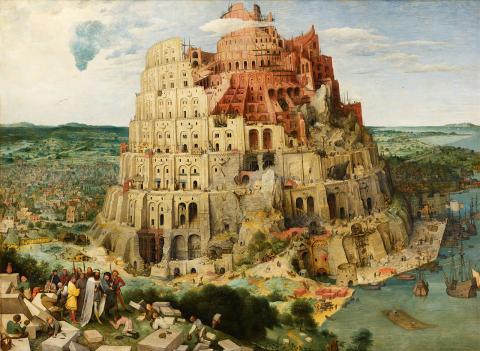Wiser, more virtuous men before us who witnessed the workings of despotic governments in the 20th century observed that the manipulation of language is absolutely necessary in order for the unnatural form of despotism to reign, which makes the case of the United States curiouser.
American political discourse, as it stands today, bears the marks of manipulation, yet a central manipulator seems to not exist. It’s usually as a consequence of despotism that words lose meaning and language becomes a machine for authorities to exploit. As it stands today, American political discourse is an incoherent mess, but at first glance it would be much too far a stretch to say we live in the clutches of despotism. The egg exists, but, curiously enough, without the prerequisite chicken.
Tea partiers are utterly correct when they angrily point out that too many people who are not conservative call themselves conservative.Dr. Patrick J. Deneen concisely describes what conservatism in the American context actually means: a consistent resistance to change, severe respect for traditional authority and religious mores, opposition to “foreign entanglements” and a standing national army, and, most interestingly, opposition to the forces of commercialism, globalization, free trade, and mass liberal capitalist economics.
Yet, it is the opposite of the latter two that have become key identifiers of so-called conservatives and the GOP. That, and a virulent hatred of “liberalism.”
Liberal and progressive are used interchangeably by both the right and left, but it was the left that started the practice. Throughout the early 20th century, progressive presidents beginning with Teddy Roosevelt, Woodrow Wilson, and Franklin Roosevelt used “liberal” synonymously with “progressive” despite the fact they represent two different -- albeit related -- ideas.
The basic tenet of liberalism is, as the word’s root suggests, liberty -- specifically individual liberty. Liberalism promotes self-government (not necessarily democracy) where state power is subject to individual rights. Economically, liberalism bases itself on the individual’s right to private property and economic autonomy in a free-market system.
Progressivism falls under the umbrella of liberalism, but with some misgivings. While progressivism embraces the innovations of capitalism and its potential to create opportunities for the lower classes, it believes that a powerful, centralized state should exist to regulate the economy and temper the social and economic ills that result from liberal capitalism.
Despite their key differences, the left successfully equated the two. America’s “liberals” were, and are, actually progressives.Classical liberals like F.A. Hayek and Milton Friedman tried to defend laissez-faire liberal capitalism from New Deal progressivism, fearing that a powerful, bureaucratic government would not only destroy the economy, but also individual freedom. Conservatives, also opposed to progressivism, employed classical liberal arguments against it while waging a messaging campaign against “liberals” and “liberalism.”
Through their efforts, particularly during and after the Reagan presidency, “liberal” became a dirty word in politics despite the fact that economic liberalism became a fundamental tenet of “conservative” politics. The GOP and conservatives trashed “liberalism” while adopting its economic foundation.
Nowadays, “liberal” is making a comeback, but once again as a synonym for progressive. Meanwhile, on the right, the coalition of classical conservatives, economic liberals, and right-libertarians is unraveling, a victim of its glaring contradictions.
So far, economic liberals and right-libertarians seem to be winning the fight for the soul of the Republican Party. Classical conservatives have suffered serious defeats in the culture wars, with the exception of abortion and gun rights, and are regularly blamed (though perhaps unjustly) for the GOP’s woes.
Partially as a consequence of their losses, but mostly because of the organized and monied efforts of economic liberals and their corporate media machines, the conservative anti-big business, anti-economic liberalism voices are systematically drowned out.
The evidence is in the politicians “conservatives” elect: they are socially conservative, yet are enthusiastic students of liberal economics à la Friedman and Hayek (both of whom rejected conservatism).
Additionally, a crop of right-libertarian inspired politicians are climbing the party’s ranks. American libertarianism (better known as right-libertarianism) advocates for the diminution of the state and the replacement of public bureaucracies with privately run entities.
Right-libertarianism believes that laissez-faire capitalism is the best vessel for individual liberty, which in turn is the highest political end. Tradition and conservation are anathema to libertarians.
The American conception of libertarianism is precisely that: an American conception. With the exceptions of the U.S. and, to a lesser extent, England, nowhere else in the world does libertarianism mean what it does in the United States.
Libertarian is, in fact, a French word that was first used by European communist anarchists (i.e. libertarian socialists) in the 19th century. While right-libertarians and classical libertarians agree that the state is unnecessary and an affront to liberty, right-libertarians arrive at the exact opposite conclusion of libertarianism, favoring instead distilled economic liberalism.
The simple fact of the matter is that it is paradoxical to be a conservative and an economic liberal. Capitalism is explicitly anti-conservative. It is a revolutionary force that causes social upheaval, destroys traditional livelihoods, and conquers traditional values with material desires.
Yet, nothing less than dogmatic support of liberal capitalism is required to earn “conservative” stripes (along with unquestioning support of the military industrial complex, the unholy combination of unhinged liberal economics and violent statism).
As Deneen correctly quips:
“There is only one party in America today–your choices are liberalism with deliberate speed or liberalism in a hurry.”
The economic issues that “bitterly separate” American conservative liberals from liberal progressives are about tax brackets, how thin a social safety net the state should provide, how much should the state subsidize farmers and businesses, etc.
No doubt, it would be crass to consider these issues purely cosmetic -- they have serious implications for millions of people -– but lawmakers and talking heads are essentially fighting over an anthill on top of a mountain. The real political aisle doesn’t separate two sides. It’s the one everybody walks inside of before they kneel at the gilded altar of capitalism.
